
The World Bank is providing Egypt with US$ 500 million in a bid to improve housing conditions for low-income households in the country, according to a press release.
The significant allocated fund is aimed at strengthening Egypt’s Social Housing and Mortgage Finance Fund which oversees the ”Inclusive Housing Finance Program Housing program” launched in 2015.
The latter aims to provide affordable housing to almost 1 million egyptian nationals of low and middle incomes by 2024. Prioritizing women and youth, the program also seeks to supervise the implementation of the housing programs, manage land use and design policies.
“Affordable housing is essential to contributing to national socio-economic development and the achievement of the United Nations’ Sustainable Development Goals,” stated Rania Al-Mashat, Egypt’s Minister of International Cooperation, who represents Egypt on the World Bank’s Board of Governors.
“Urbanization and development are indivisibly linked to one another. Our partnership with the World Bank builds on the Inclusive Housing Finance Program’s success in creating safe and affordable housing, and in building resilient societies and economies.”
In a 2019 report by the Central Agency for Public mobilization and Statistics (CAPMAS), it was estimated that 32.5 percent of the population lived below the poverty line which was set at 735.7 EGP, while 6.2 of the population was living under extreme poverty.
In Egypt, purchasing apartments and houses is deemed to be a privilege as most housing opportunities are expensive and are far from the purchasing power of average citizens. Moreover, renting apartments can equally be financially taxing on individuals whose incomes are around or below the minimum wage.
State housing programs have been around for decades but many have failed due to the location of the housing which is often far from important and essential activity hubs, such as markets, hospitals and schools, as well as workplaces.
As such, the program has benefitted almost 290,000 families, of whom 66 percent were beneficiaries under the poverty line. It has also enabled the use of up to 91,000 unitized vacant homes to families hoping to own the housing or rent it for additional income.
“Through this project we are continuing our commitment to improving the livelihoods and productivity of Egyptians, while encouraging private sector participation in social housing. This is crucial for the success of the country’s reform program,’’ said Marina Wes, World Bank Country Director for Egypt, Yemen and Djibouti.
The additional funding is aimed at encouraging the private sector to participate in the construction of the housing, and to increase demand-side subsidies delivery for the housing.
Featured image by Hassan Ibrahim.







Comments (0)